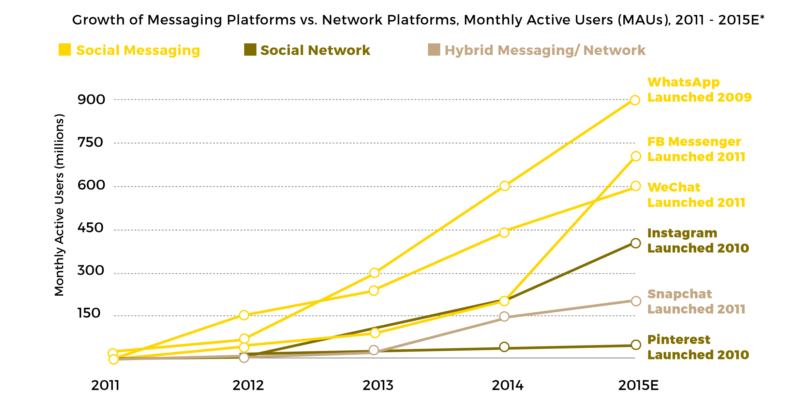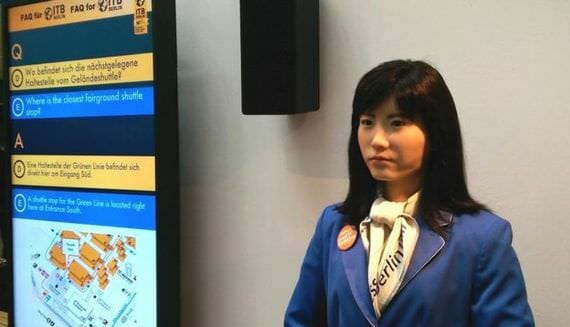5 Technology Trends Transforming the Travel Industry

Over the past few months we’ve published several articles on the relationship between technology and the tourism industry. There’s plenty happening. And so many things to be excited about and hopeful for. We thought it would be a good idea to aggregate all of these things into one handy blog post. So here you have it, 5 ways that technology is set to transform the travel industry...
Messaging
Back in January we wrote at length about the upsurge in the popularity of messaging platforms such as WhatsApp.
The data in the table below, courtesy of a Skift report, shows that up until last year, across the social media sphere messaging has been the fastest-growing behaviour since 2010. Platforms such as WhatsApp, WeChat and Facebook Messenger each have more monthly users around the world than Instagram, Snapchat and Pinterest combined. And it’s a trend that looks set to continue as we move forward.

That’s all well and good, you might say, but what exactly does this have to do with the travel industry? Well, to understand it’s best to take a step back and think about what exactly messaging platforms offer and why they are growing in popularity.
The user base of instant messaging platforms is growing at an incredibly fast rate. This, alongside an active base of users, is to be expected, as many people replace older methods of communication with the latest offering from WhatsApp and the like. Instant messaging provides that which technology should provide: a substantial upgrade on the normal way of doing things. Texting, faxing and writing letters are becoming increasingly obsolete, as group messages and instantaneous conversations offer many welcome advantages.
A result of the instantaneous nature of messaging platforms has made it the next best thing to video-calling, which is already the next best thing to meeting face to face with someone. And this is where we come to messaging platforms’ relevance to the travel industry.
We’ve all been there. Something goes wrong on a holiday – perhaps a hotel room has been double booked, or an excursion has been cancelled at the last minute. During these times what you want is an instantaneous response from your travel agent. You want answers quickly. This is where there is huge potential for tourism companies. The moment that customer service becomes as responsive and personalised as any other WhatsApp conversation you have with a friend or family member, travellers are going to be happier and far better served.
But don’t take our word for it. It’s already happening. Airlines and hotels are starting to get involved. Hyatt is on Asian service WeChat; Shangri-La uses the same platform for content marketing purposes. Airline KLM has tested WhatsApp for Dutch customers with positive feedback, and is considering further moves into instant messaging.
We can only hope that, as more companies in the travel industry embrace the potential of messaging platforms, the slide in customer loyalty begins to slow down as a result.
Robotics
This is an exciting one, but we’d be lying if we pretended to know exactly where the robotics trend will take the travel industry. On the face of it, robots and travel don’t seem to have that much in common. But when you consider the potential applications in terms of customer service, robots helping with translations, check-ins, tours and even food service, might not be too far away.

Need convincing? Well, the Henn-na Hotel in Nagasaki, Japan, has already become the world’s first hotel to be completely staffed by robots. From receptionists to food service waiters, guests rely on robotic friends for their every need. And while this is in no way indicative of a sudden sweeping trend, others in the tourism industry are beginning to take notice of the potential for robotics and artificial intelligence.
One obvious application surrounds the potential for seamless translation. As translation software becomes more and more powerful, interactions between staff and guests can be augmented to reduce common misunderstandings and generally make communication a whole lot simpler.
Virtual Reality
We touched upon the potential for virtual reality in the travel industry relatively recently. On the face of it, the two don’t seem to go together at all, but after a dig below those initial impressions, there’s a lot more to this trend that you might expect.

So yes, the two do seem like polar opposites. Genuine travel is a journey, while virtual reality is, by definition, artificial. You might think that virtual reality could reach a point at which it replaces tourism with computerised experiences, but it’s thought that it will have the opposite effect.
Instead of visiting Barbados from your living room for a holiday, a cheeky virtual experience can actually be enough of an incentive, a taster if you will, to push travellers to go ahead and make bookings.
According to Abi Mandelbaum, CEO and co-founder of YouVisit, virtual reality can both drive bookings and generate interest. The company’s analytics have found that more than 13% of people who take a VR tour of a destination are interested enough to take the next step in the process of planning an actual trip. “You can’t replicate real life in VR”, he said, “but you can give people a preview and understanding of what they would experience if they went to visit physically”.
Read more on this topic: Virtual Reality Tech Not a Threat to Travel Industry (Yet)
Potential travellers can also take virtual tours of hotels or resorts, which will give enough of a feel of the place to make an informed decision, without replacing the fundamental wish to travel in the first place.
As virtual reality progresses, we may well reach the point at which travelling is just as fun from the comfort of your own sofa. But as long as that day is in the distant future, travel industry professionals can use the technology to their advantage.
Social Media Driven Marketing
It would be remiss of us not to pay some attention to the way that social media has transformed the way marketing works in the travel industry. While previously brands and agencies may have relied upon traditional magazine ads and TV campaigns, the focus has now shifted to influencer marketing and social media strategy.
More than ever, travellers are sharing their experiences online, inspiring one another and offering valuable insights and tourist information free of charge. This, understandably, has been quite a lot for the industry to take in and adapt to.
In a market where loyalty is virtually non-existent, brands are starting to realise that communicating useful guidance and inspirational media is the way to become a thought leader. Through social media platforms travel agencies can now build a huge following by producing authentic, engaging content, not simply hard-selling whatever they have to offer as in times gone by.
Social media also paves the way for direct, public interactions between brands and customers. In the travel industry this means that bad reviews can easily go viral and damage your reputation. In an online world where opinions are readily shared, we have seen that the power of online reviews is incredible, perhaps even disproportionately so.
Twitter, Facebook, Instagram and Pinterest all offer fantastic ways for travel brands to reach out to new customers and develop a loyalty that was thought long lost. You just have to use them the right way.
Smarter Software, obviously

Smarter software means, smarter, more connected and reactive travel agencies.
At Travelshift we’re proud to be pioneering the next generation of travel marketplace platforms. We understand that customers don’t want to feel like a statistic, and that they want to have the choice between multiple authentic operators. But we also get that the travel market is dominated by several big players, and that it's incredibly hard for small operators to get noticed.
That’s why we’ve built our software from the ground up, with the ultimate aim of a scalable platform to help you build a thriving travel marketplace. With our software you can band together a marketplace of traders offering tours and excursions in whatever travel niche you desire. We've included a range of tools to help you on your way, from a ready-to-go blogging and community platform to proprietary translation & localisation features.
Travelshift software is leading the way.
Contact us today to find out more about becoming a partner. You can read more about potential partnerships here.